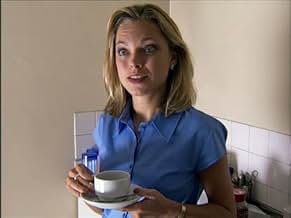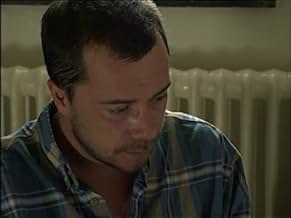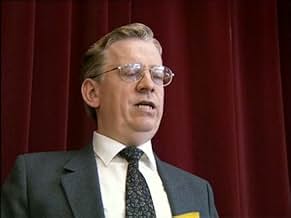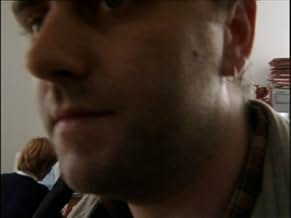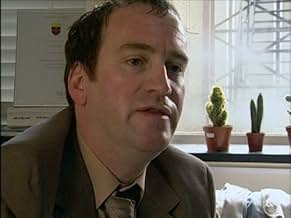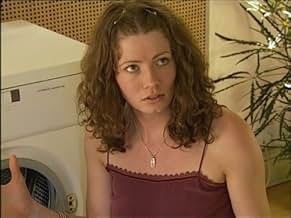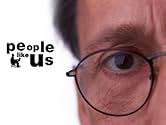La trama no ha sido revelada.La trama no ha sido revelada.La trama no ha sido revelada.
- Nominada a1 premio BAFTA
- 2 premios ganados y 2 nominaciones en total
Explorar episodios
Mark Hadfield
• 1999–2001
Mike Haley
• 1999–2001
Ewan Bailey
• 1999–2001
Iain Rogerson
• 1999–2001
Jilly Bond
• 1999
Beth Chalmers
• 2001
Colin Murphy
• 2001
David Roper
• 2001
Opiniones destacadas
Chris Langham's fictional documentarian "Roy Mallard" follows people in various professions for a day in their life, to show that they are "just like us". Some of the episodes are extremely funny (the befuddled photographer or the dysfunctional police station are quite good). The humor is often based on embarrassment and, unfortunately, in some of the episodes, the embarrassment and the tension simply mount up and make it as unpleasant as a family argument caught on video.
In the best episodes, the humor rises more from sheer incompetence than tension -- not only from the professionals who have no notion of what they're doing, but from Mallard himself, an utterly inept film maker and interviewer. His voice-overs are pointless. His questions are insipid, and as often as not he'll receive a question answering a question and he'll wind up doing most of the talking. He also gets too involved, bumping into things and sometimes causing the very problems he films.
Occasionally a recognizable face surfaces -- Bill Nighy as the photographer, for instance. Most of the actors are suitably unknown and do a very good job playing real people.
This show is not for people who don't appreciate subtle humor and can't follow a running gag (a joke may be set up in passing in the first few minutes, with the payoff coming much later). The shows are mostly low-key, and Mallard may be sleep-inducing for some. "People Like Us" is at its best is letter-perfect but drags in the episodes where the jokes aren't working.
In the best episodes, the humor rises more from sheer incompetence than tension -- not only from the professionals who have no notion of what they're doing, but from Mallard himself, an utterly inept film maker and interviewer. His voice-overs are pointless. His questions are insipid, and as often as not he'll receive a question answering a question and he'll wind up doing most of the talking. He also gets too involved, bumping into things and sometimes causing the very problems he films.
Occasionally a recognizable face surfaces -- Bill Nighy as the photographer, for instance. Most of the actors are suitably unknown and do a very good job playing real people.
This show is not for people who don't appreciate subtle humor and can't follow a running gag (a joke may be set up in passing in the first few minutes, with the payoff coming much later). The shows are mostly low-key, and Mallard may be sleep-inducing for some. "People Like Us" is at its best is letter-perfect but drags in the episodes where the jokes aren't working.
The other comments have covered this series very well but I just had to post my comments.
There has been a new wave of comedy recently, the office, people like us and to a lesser extent Unnovations. They are all packed with jokes but its always left to the viewer to pick up on them.
People like us seems to have an amazing number of jokes in every episode. Roy's commentary is inspired and many times you have to think carefull about what he has said until you realise that it's total gibberish. My example is "he has worked in such diverse places as Yeovil".
Chris Langham has perfect timing, I've never laughed so much as someone just saying "oh" before. Each episode Roy manages to put in foot in every possible cowpat in sight. In fact, in the entire series, Roy is the only normal person. Everyone he interviews misunderstands his questions in an amazingly stupid way. They all tend to be tragic characters who put on a brave face.
The sad thing is that many of the jokes are just thrown away and pass the viewer by.
"she worked on an oil rig just off Norway, then, after servere weather, just off Denmark"
I don't think there will be another series and to be honest I hope there isn't. This series is perfect as it is, any more and the jokes will run thin or they will use the same jokes again. 12 episodes is impressive enough.
Chris Langham has been around for quite a while, he was in Life of Brian and I'm pleased his talent has found a platform at last.
There has been a new wave of comedy recently, the office, people like us and to a lesser extent Unnovations. They are all packed with jokes but its always left to the viewer to pick up on them.
People like us seems to have an amazing number of jokes in every episode. Roy's commentary is inspired and many times you have to think carefull about what he has said until you realise that it's total gibberish. My example is "he has worked in such diverse places as Yeovil".
Chris Langham has perfect timing, I've never laughed so much as someone just saying "oh" before. Each episode Roy manages to put in foot in every possible cowpat in sight. In fact, in the entire series, Roy is the only normal person. Everyone he interviews misunderstands his questions in an amazingly stupid way. They all tend to be tragic characters who put on a brave face.
The sad thing is that many of the jokes are just thrown away and pass the viewer by.
"she worked on an oil rig just off Norway, then, after servere weather, just off Denmark"
I don't think there will be another series and to be honest I hope there isn't. This series is perfect as it is, any more and the jokes will run thin or they will use the same jokes again. 12 episodes is impressive enough.
Chris Langham has been around for quite a while, he was in Life of Brian and I'm pleased his talent has found a platform at last.
What appears to be a serious documentary about 'a day in the life' of some member of a profession (policeman, priest, bank manager etc.) is actually a very clever spoof of a documentary. If you listen carefully you realize that most of what the commentator is saying is gibberish and very funny. The commentator (Roy Mallard) is mostly off camera (except for the occasional hand when requested) and is a fine example of how not to do an interview. Some examples of his commentary 'X is 2 hours from London both by rail and train', 'It's 4pm and everybody has left school except for those who have stayed behind', 'It's 2 p.m. and already the Japanese are on time' and 'the world of financial money'. That's not all. The people whom he interviews are also prone to mangling the English language with many misstatements and misunderstandings. This is not the brash, crude humour that many Americans enjoy but more subtle and laid back. American humour tends overdo the one-liners in order to make sure the audience 'gets it'. This is the type of humour that has to be experienced more than once as it is very easy to miss the subtleties the first time around. Overall, an acquired taste, but much to my liking.
9jefu
When I first saw this it took me a few minutes to catch on to the fact that it was not a real documentary - it looks and sounds like a real documentary if you don't pay attention, but when you do pay attention, the humour is pervasive and brilliant.
Humor is often associated with a darker side - cruelty, pain, sadness. Some of the funniest movies, books and tv shows are those that intermix these well. American TV doesn't seem to explore this side very much, but British TV comedy does and some of the best of british sitcoms are those that do this deeply - Basil Fawlty wouldn't be anywhere near as funny if he were just Bill Cosby. "The League of Gentlemen" goes quite a ways in this direction - far enough to squick some watchers. "People Like Us" is nothing like that extreme, but much of the humour is based on situations that (if they were happening to us) would probably not be considered "good days".
"People Like Us" takes the form of a documentary TV show (named "people like us") with "Roy Mallard" following "people like us" around in their jobs and interviewing them. We never really see Roy, but we hear his questions and comments. So far, it looks like many documentaries. And if you only watch
casually, it continues to look that way. But if you look and listen more closely, it becomes far more interesting. And very funny.
Part of the humour comes from Roy's commentary, which is wonderfully deadpan, but which often includes odd mistakes and misstatements. If you don't listen, you'll miss them - as often the various portions of the sentence make complete sense ("Although since the beginning of the twentieth century the number of people attending church regularly has fallen by twice that amount over the same period of time...") Part of the humour comes from the people he's interviewing. In some cases these people are hurting - they're on the verge of failure, or even beyond. In other cases things just go wrong. A bank manager forgets the password for his safe, a real estate agent gets lost. Roy walks off with a childs toy. Minor events and given minor consideration with no fanfare - but often very, very funny. (In American sitcoms, there'd be a laugh track, and sometimes this kind of incident would be the basis for a full episode.)
Interestingly, after a couple of episodes, it begins to seem that the title "People Like Us" is really true for Roy. The people featured are the ones that seem most like him in some ways. We never see Roy and don't hear much about him, but we do discover he is married and that this show for him is perhaps a step down from the farm report. And in some ways this show is a serious dissection of Roy, seen only in how other people are interacting with him.
Its hard to describe this program and how funny it can really be. Best thing to do is watch it and see for yourself.
Humor is often associated with a darker side - cruelty, pain, sadness. Some of the funniest movies, books and tv shows are those that intermix these well. American TV doesn't seem to explore this side very much, but British TV comedy does and some of the best of british sitcoms are those that do this deeply - Basil Fawlty wouldn't be anywhere near as funny if he were just Bill Cosby. "The League of Gentlemen" goes quite a ways in this direction - far enough to squick some watchers. "People Like Us" is nothing like that extreme, but much of the humour is based on situations that (if they were happening to us) would probably not be considered "good days".
"People Like Us" takes the form of a documentary TV show (named "people like us") with "Roy Mallard" following "people like us" around in their jobs and interviewing them. We never really see Roy, but we hear his questions and comments. So far, it looks like many documentaries. And if you only watch
casually, it continues to look that way. But if you look and listen more closely, it becomes far more interesting. And very funny.
Part of the humour comes from Roy's commentary, which is wonderfully deadpan, but which often includes odd mistakes and misstatements. If you don't listen, you'll miss them - as often the various portions of the sentence make complete sense ("Although since the beginning of the twentieth century the number of people attending church regularly has fallen by twice that amount over the same period of time...") Part of the humour comes from the people he's interviewing. In some cases these people are hurting - they're on the verge of failure, or even beyond. In other cases things just go wrong. A bank manager forgets the password for his safe, a real estate agent gets lost. Roy walks off with a childs toy. Minor events and given minor consideration with no fanfare - but often very, very funny. (In American sitcoms, there'd be a laugh track, and sometimes this kind of incident would be the basis for a full episode.)
Interestingly, after a couple of episodes, it begins to seem that the title "People Like Us" is really true for Roy. The people featured are the ones that seem most like him in some ways. We never see Roy and don't hear much about him, but we do discover he is married and that this show for him is perhaps a step down from the farm report. And in some ways this show is a serious dissection of Roy, seen only in how other people are interacting with him.
Its hard to describe this program and how funny it can really be. Best thing to do is watch it and see for yourself.
¿Sabías que…?
- TriviaThough host Roy Mallard (voiced by Chris Langham) is never actually seen on-screen, a part of him will be seen in each episode, either a body-part or a reflection - a glass sliding door in episode 1.2, 'The Estate Agent', on the CCTV in 1.3 'The Police Officer' and in a shop window in episode 1.5, 'The Photographer' as well as seen briefly in a badly developed photo. In 1.4 'The Solicitor' his cheek and nose are seen when he spills his tea.
- Citas
Alison: This is going to be it now, isn't it?
Selecciones populares
Inicia sesión para calificar y agrega a la lista de videos para obtener recomendaciones personalizadas
- How many seasons does People Like Us have?Con tecnología de Alexa
Detalles
Contribuir a esta página
Sugiere una edición o agrega el contenido que falta

Principales brechas de datos
By what name was People Like Us (1999) officially released in Canada in English?
Responda

